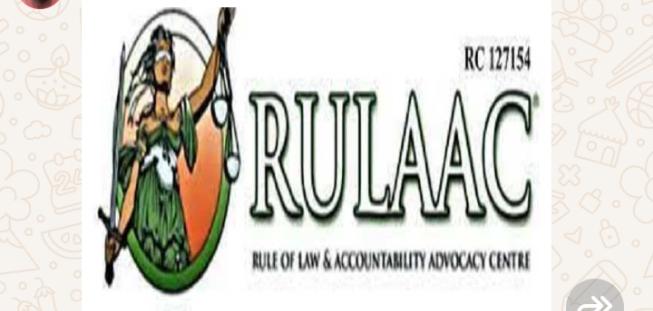By Tony Adibe
A civil society group, the Rule of Law and Accountability Advocacy Centre (RULAAC), and eight other similar organizations, have appealed to the National Human Rights Commission (NHRC), to without further delay, investigate thoroughly alleged extrajudicial killings, extortion of families whose relatives are in custody, and sexual abuse of women by state and non-state actors in the South-East Zone of Nigeria.
The RULAAC Executive Director, Okechukwu Nwanguma, and leaders of eight other civil society organizations, signed the petition that was delivered to NHRC, on June 19, 2024, in which they asked the human rights commission to “undertake prompt, exhaustive and effective investigation into the persistent Ezza-Effium and Ezza-Ezeilo conflicts which have continued to result in massacres,” within that part of Ebonyi State.
The petitioners also bemoaned the periodic invasion and attacks on Igga and Nimbo communities in Uzo-Uwani Local Government Area of Enugu State purportedly by personnel of the Nigerian Army and Nigeria Police Force. According to the rights groups, “the invading security forces shot indiscriminately, killing community members and burning several houses and other properties.”
Nwanguma and the others further stated in their petition : “We, the undersigned civil society organisations and other concerned groups and citizens, alarmed by frequent incidents of organized attacks, killings, extortion, sexual violence, and destruction of properties in the Southeast, portending far-reaching human rights violations, feel compelled to call on the National Human Rights Commission to deploy all necessary instruments available to it, which may include the appointment of a special investigation panel, to inquire into these incidents.”
They said that they were concerned by the “oppressive atmosphere of siege, impunity and fear partly engendered by the federal government’s single narrative that narrows insecurity in the South-East almost exclusively to the activities of the Indigenous People of Biafra (IPOB).”
According to the rights groups, “This single narrative explains why the federal government ignores other drivers and dimensions of insecurity and the need for a holistic and multidimensional approach.”
They added that “this single narrative,” also informed the federal government’s tendency to “solely deploy force in its response to insecurity, and its neglect of community engagement and dialogue, as well as addressing the socio-economic and political root causes and drivers of crime and insecurity.”
The petitioners further lamented that “This approach has contributed to escalating insecurity, fueling the cycle of violence and resulting in gross human rights violations. The federal government’s penchant for deploying “special military operations’’ such as ‘’Operation Egwu Eke (Python Dance)’’, Operation Crocodile Smile, as well as special police operation, ‘Operation Restore Peace’ for the South-East underscores this narrative and its shortcomings”.
Recounting that while launching the special police operation at the Michael Okpara Square, Enugu in 2021, the groups said that the then Inspector General of Police, Mr. Usman Alkali Baba directed police officers thus: “Don’t mind the media shout; do the job I command you. If anyone accuses you of human rights violation, the report will come to my table, and you know what I will do. So, take the battle to them wherever they are and kill them all. Don’t wait for an order.”
The group added that the IGP in issuing that reckless directive said it was in compliance with the then President Buhari’s previous “shoot-on-sight” order issued to security forces against IPOB. They said that the outcome of these orders, has been a “floodgate of mass raids and indiscriminate arrests and detention in inhuman and degrading conditions; torture, enforced disappearances and extrajudicial executions.”
The petitioners further claimed that there are also indications that “security agents exploit the opportunity for self-enrichment, including extortion of huge sums of money from family members of detained victims.”
RULAAC and the others equally insisted that “The ubiquity and widespread presence of security checkpoints along all interstate highways and inner-city roads across states in the South-East contribute to the atmosphere of militarisation, siege and shrinking civic space.
“Among the notable recent cases of what increasingly appears to be a systematic and serial abuse of human rights in the South-East perpetrated by both state and non-state actors are the following: Invasion of Igga Community in Enugu State.”
The petitioners also said: “We received with sadness, reports of the invasion and attacks on Igga community in Uzo-Uwani Local Government Area of Enugu State at about 10 p.m. on Saturday, May 4, 2023, by personnel of the Nigerian army and Nigeria Police Force.
“The invading security forces shot indiscriminately, killing community members and burning several houses and other properties. According to a Premium Times Report of May 6, 2024, one of the residents, identified as Richard Okoye, about 70-years-old, died during the invasion.
Providing explanation for the operation in a statement the next day, the police spokesperson in Enugu State, Daniel Ndukwe, claimed “criminal members” of the community, on Friday, murdered two police operatives and three members of a Neighborhood Watch Group in the area.
“Mr. Ndukwe, a deputy superintendent of police, said a combined security team comprising three police operatives and four members of the Neighbourhood Watch Group provided security for a team of visiting investors from Lagos State on a tour of a proposed agricultural investment site in the area.
“Responding to the allegations of invasion of the community and burning of houses, the police chief said those pushing the narrative were attempting “to misinform and mislead” Nigerians.
He warned those circulating video clips and accusing the combined security operatives of burning and looting houses in the community to “desist forthwith,” but did not deny or confirm the allegation against the operatives.”
RULAAC and the others also commented on the massacres arising from the persistent Ezza-Effium and Ezza- Ezeilo conflicts in Ebonyi State. The petitioners stated: “Considering that the Ebonyi State Government is considered as having vested interest in the conflicts and therefore not trusted to be impartial in the resolution of the conflicts, we call on the NHRC to undertake an independent investigation with a view to ascertaining the roots and issues in the conflicts and why the conflicts and massacres have persisted over the years.”





